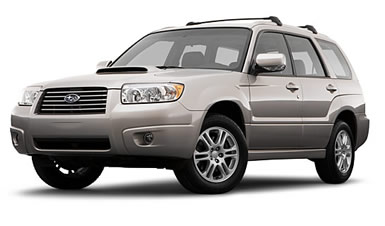|
|

San Francisco: Crossover
utility vehicles (CUVs) are the rage today. Over the last ten years,
sales of car-based vehicles that act like SUVs have boomed from
essentially nothing to about 2.5 million units. Subaru has been in the
thick of it from the start, with its sturdy, comfortable Outback.
The Outback debuted in
the mid 1990s as a rugged-looking wagon with standard all-wheel-drive
and a hint of enhanced ground clearance. Unlike trucks with big levers
to engage the mud-only 4WD, this was a car you could drive to the summer
cabin one day and to the opera the next. You might say the Outback gave
Subaru a new lease on life, because shortly after, the company became
Americaís first all-wheel-drive only manufacturer.
The Forester arrived a
few years after the Outback. The Forester borrowed the tall, square roof
and chunky lines from SUV leaders like the Ford Explorer and Jeep
Cherokee, while retaining the same car-based Subaru goodness under the
skin. In the Forester, the roof may be high, but you sit at essentially
car height.
The Forester was
restyled a few years ago, but for 2006 it gets a profoundly altered face
and a more modest freshening to the tail. The new nose carries a wide
version of the new slim grille introduced recently on the larger B9
Tribeca luxury crossover. The new, larger mirrors get integrated turn
signals.
For 2006, engine power
grows, particularly for the turbocharged, intercooled 2.5 XT. Its
horsepower jumps from 210 to 230, which is not bad for a 3,300-pound
car. This engine is rated at 20 City, 26 Highway.
The other two models,
the base 2.5 X and the luxurious L.L. Bean Edition, use a naturally
aspirated engine that makes just 173 horsepower, but thatís still up
from 165 last year, thanks to variable valve technology.
Both engines feature
Subaruís renowned horizontally opposed four-cylinder engines. You know
who else uses the flat engine configuration, donít you? Porsche! The
shape of the engine lowers the center of gravity for surer handling. The
sound is still a little different, but the Forester is so well insulated
and smooth that youíll hardly notice.
My test unit was a
Crystal Gray 2.5 XT, so I got to enjoy blasts down the road with the
turbo. With the five-speed manual transmission, the Forester is almost
sporty, even with its conservative shape. You can order up a four-speed
automatic if you would like to spare your left leg, but the driving will
surely be less invigorating. The automatic wonít hurt your fuel mileage
either; in fact, the City mileage figure is one mpg better!
Subaru not only
breathed on the engines, but they tweaked the suspension and braking
systems this year. The engineers revised coil spring rates, changed the
shock absorber valving, and modified the brake booster for improved
feel.
The Forester is not
Subaruís price leader, thatís the base Imprezaís job. So, the 2.5 X has
such standard features as air conditioning with air filtration, cruise
control, keyless remote, a security system, power windows, power locks,
and power mirrors. Four-channel antilock brakes are included. You get a
100-watt AM/FM/Weatherband radio with single-disc CD. Little things like
an outside temperature gauge, cargo area cover, and a rear seat armrest
make everything pleasant.
You can upgrade the car
pretty quickly with the Premium Package, which for $2,350, makes the
wheels alloy, upgrades the sound system, heats those external mirrors,
slaps leather on the steering wheel, shift knob, and brake lever, and
even provides a windshield wiper de-icer for those in cold climates.
Putting disc brakes at all four corners and a limited-slip rear
differential in helps, too.
The L.L. Bean Edition
continues its role as the pampering model. It gets its own snazzy
wheels, comes only with the automatic, and gives you a very nice MOMO
steering wheel, among other things. And the leather seats are embossed
with the L.L. Bean logo, of course.
The 2.5 XTís biggest
draw is the turbocharged engine, but it gets its own wheel package,
subwoofer, and sportier gauges, too. It also wears a prominent hood
scoop, like its cousin, the powerful WRX, with which it shares its
engine.
Depending on which
transmission you select (or accept, in the case of the L.L. Bean
Edition), your all-wheel-drive system will work differently. Both send
power to the wheels that have grip, but the system that accompanies the
manual transmission uses a viscous coupling locking center differential
that divides engine power half front, half rear.
If wheels in front or
back slip, power goes to the other set. The four-speed automatic
transmission uses electronically managed variable transfer clutch. This
system can fine-tune its response to the road conditions, sending power
to a single rear wheel if necessary.
Besides the inherent
safety of a well-build car and four-wheel traction, the Forester is
mighty crashworthy, too. It earned highest ratings from the Insurance
Institute for Highway Safety (IIHS).
Pricing is
reasonable. These mid sized cars start at just $22,420 for the 2.5 X,
working up to the 2.5 XT at 28,550. The Forester really is the best of
both worlds, the comfort of a car and the practicality and all-weather
security of an SUV. By
Steve Schaefer © AutoWire.Net - San Francisco

Subaru Home Page
Byline: Syndicated content provided by Tony Leopardo ©
AutoWire.Net
Column Name: The
Forester really is the best of both worlds
Topic: The
2006 Subaru Forester
Word Count:
938
Photo Caption:
The
2006 Subaru Forester
Photo Credits:
Subaru Internet Media
Series #:
2006 - 08
Download
the Microsoft Word version here:
2006
Subaru Forester
Download the Original Image File here:
2006 Subaru Forester


|
